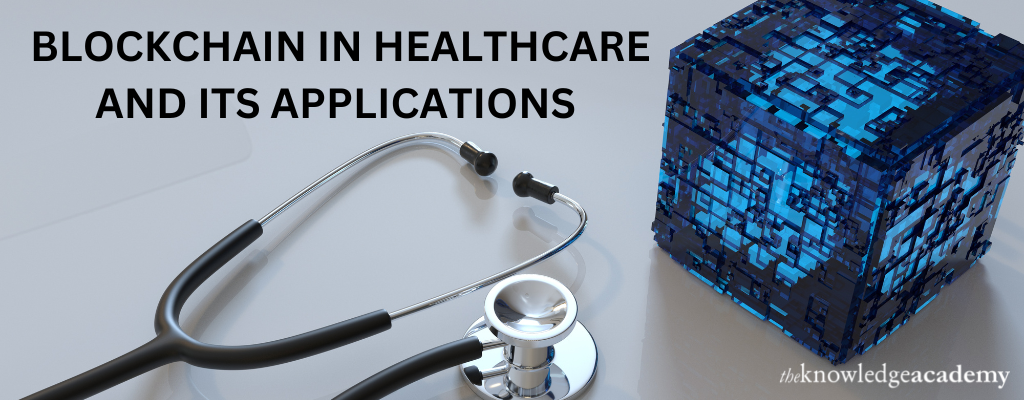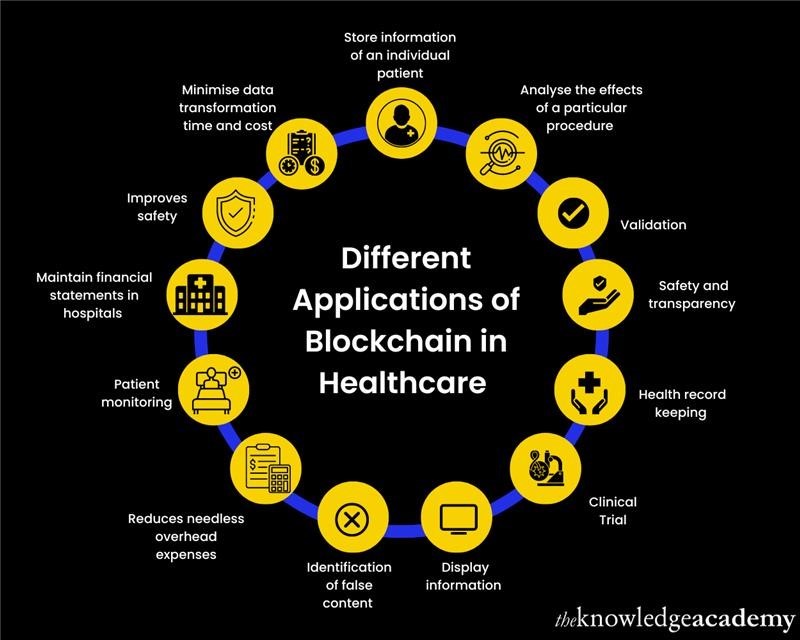We may not have the course you’re looking for. If you enquire or give us a call on 01344203999 and speak to our training experts, we may still be able to help with your training requirements.
Training Outcomes Within Your Budget!
We ensure quality, budget-alignment, and timely delivery by our expert instructors.

According to Statista, in 2017, 47% of respondents believed that adopting Blockchain Technology in healthcare leads to heightened data security and integrity. From managing the pharmaceutical supply chain to controlling the spread of dangerous diseases, Blockchain is used in healthcare to secure patient data.
In the healthcare system, Blockchain network is used to store and share patient data amongst hospitals, diagnostic labs, drug companies, and doctors. Blockchain applications can precisely detect serious errors, including potentially deadly ones, in the medical industry. The healthcare sector can enhance the efficiency, security, and transparency of sharing medical data.
Medical institutions can acquire insight and improve the analysis of patient information with the use of this technology. In this article, we'll dive deeper into why healthcare needs Blockchain and some of its applications. Let’s get started!
Table of Contents
1) The need for Blockchain in Healthcare
2) Different Applications of Blockchain in Healthcare
3) Some Blockchain use cases in Healthcare
4) Future Scope of Blockchain in Healthcare
5) Conclusion
The need for Blockchain in Healthcare
The pace of development is accelerating at ever-increasing rates in healthcare. Today, there is a demand for high-quality medical facilities supported by modern technology. Blockchain might be necessary for revolutionising the healthcare industry. Additionally, the health system landscape is shifting towards a patient-centred strategy emphasising two key components: readily available services and suitable healthcare resources. It improves healthcare organisations' ability to deliver proper patient care and top-notch medical facilities.
Using this technology, the time-consuming, recurring process of health information exchange, which contributes to high healthcare expenses, can be resolved efficiently. Citizens can participate in health research initiatives using Blockchain technology. Moreover, improved research and data sharing on public wellness will enhance care for various groups. The entire healthcare system and organisations are managed through a single central database.
Data sharing, privacy, and interoperability issues have, up until now, been the biggest challenges in population health management. Blockchain provides a reliable solution to this issue. When used appropriately, this technology improves security, data interchange, interoperability, integrity, real-time updating, and accessibility. Data security is another primary concern, particularly regarding wearable technology and personalised medicine.
Blockchain technology addresses these difficulties since patients and medical staff need simple, secure ways to capture, send, and consult data via networks without security worries.
Learn the fundamentals of Blockchain 101 and Ethereum. Sign up for our Ethereum Developer Training now!
Different Applications of Blockchain in Healthcare

Blockchain is a relatively new and developing technology that offers exciting applications and their successful use in the healthcare industry. The development of affordable cures and advanced treatments for numerous diseases depends on smooth, effective data sharing and delivery among all the well-known network participants and healthcare providers. In the upcoming years, this will hasten the growth of the healthcare sector.
It presents several significant and spectacular opportunities for the healthcare sector, ranging from research and logistics to interactions between doctors and patients. The key applications of Blockchain in Healthcare is described below.
1) Store information of an individual patient
Health data and patient information are generated before and after the various clinical study phases. Numerous people undergo blood tests, quality evaluations, estimates, and well-being surveys. Results that demonstrate the existence of a particular document or record may be provided. Healthcare practitioners browse the data that has been saved and may have doubts about its accuracy; they will quickly verify this by comparing it to the original records that have been stored on the Blockchain system.
2) Analyse the effects of a particular procedure
Through validated access to the patient data, researchers can effectively evaluate any specific process on a huge portion of the patient population. This has important effects that improve how certain patient groups are managed.
3) Validation
Algorithms in a Blockchain validate transactions before they are connected to the chain. The authenticity is sealed until the content is encrypted, digitally signed, and stored.
4) Safety and transparency
It allows doctors to spend more time treating patients while providing exceptional protection and transparency. Additionally, it would make it possible to support any unusual disorder's clinical studies and treatments. A healthcare system's ecosystems can benefit from efficient data transmission amongst medical solution providers, leading to accurate diagnosis, effective treatments, and cost-effective ecosystems.
5) Health record keeping
Blockchain technology has the potential to be ideal for medical record-keeping. Its uses include sharing medical data, maintaining electronic medical records, controlling insurance, and carrying out administrative duties. Patients can upload their medical data to a Blockchain network using an app. The cooperation of sensors and intelligent devices is simplified based on digital Blockchain contracts.
Learn how bitcoins work and how to secure bitcoins. Register for our Bitcoin and Cryptocurrency Course now!
6) Clinical Trial
Blockchain technology is utilised in clinical studies to overcome issues with misleading results and data disintegration that don't align with the goals and objectives of the study. Blockchain will increase public confidence in clinical trials. The business analysis tool investigates how the market dynamics are changing so that the healthcare industry may comprehend the opportunities.
7) Display information
To guarantee excellent quality and that the producer of the authorised medication distributes it, the Blockchain system will show information about the medication's origins. It offers more effective protection than ever for sensitive data if used appropriately. Several industries, like finance, retail, and immobilisation, have started to leverage the Blockchain app trend to present information and gain several benefits.
8) Identification of false content
Blockchain will increase transparency and allow the detection of fake content. Clinical trials for subjects and clientele should be simple to validate. The best way to get approval is through an intelligent agreement that keeps the protocol documents implemented and their outcomes open to the public view. The technology has enabled the general public to observe what occurs in a clinical trial closely.
9) Reduces needless overhead expenses
Blockchain allows for the proper use of health records by cutting unnecessary overhead costs. Also, this technology will lessen the need for numerous intermediaries to supervise sharing of vital health information. Healthcare Blockchain technology will give service providers a complete record of each patient's medical history. The healthcare system's many issues, like interoperability, report completion, fraud, and even catastrophic data failure, can be fixed.
10) Patient monitoring
A Blockchain's trust enables healthcare providers to ensure they have access to healthcare equipment when required. Furthermore, doctors can take more time to observe patients and respond remotely to health-related situations. Monitoring the temperatures in patient rooms, the utilisation of beds, and the availability of supplies can all be improved with Blockchain in Healthcare.
11) Maintain financial statements in hospitals
In the bookkeeping process, it is essential to keep a precise record of the financial statements. The clinical trials are set up for efficient operation and evaluation. The accounting and reporting procedure has been streamlined in this case because of innovations made by Blockchain enterprises. Anyone can prepare to visit a healthcare professional and finish the paperwork in advance using this application.
12) Improves safety
Blockchain improves patient safety overall, tackles issues with medicine validity and drug traceability, and enables secure interoperability. It is the only option to replace the current supply chain management system and stop producers of fake medications from introducing versions of their products to the market.
13) Minimise data transformation time and cost
Blockchain networks reduce the time and expense of data transformation. These networks can potentially to address the problem of quickly and accurately verifying medical qualifications. They also ensure patient privacy and security. This will open up significant innovative perspectives that can alter how healthcare works worldwide.
Learn to create and deploy your Private Blockchain on Multichain. Check out our Blockchain Training Course today!
Some Blockchain use cases in Healthcare

We have categorised the use cases into three further sub-categories for your better understanding-
1) Blockchain and Data Security
The most well-liked Blockchain healthcare application is keeping critical medical data safe and secure, which is not surprising. Check out how these two businesses are using Blockchain healthcare for better security.
a) Medicalchain- Medicalchain's Blockchain creates a single point of truth while preserving the accuracy of medical records. Doctors, hospitals, and laboratories can request information on patients with a history of origin and shield the patient's identity from outside resources.
b) Guardtime- Guardtime assists healthcare companies and governments in enforcing Blockchain in their cybersecurity processes.
2) Blockchain Medical Records
Staff resources are depleted, and patient care is delayed due to gaining access to a patient's medical records. Medical records built on the Blockchain provide a remedy for these ailments. Check out how these four businesses employ Blockchain technology to build shared datasets and individualised health programmes.
a) Coral Health- Coral Health uses Blockchain to streamline administrative procedures, speed up care delivery, and enhance patient outcomes.
b) Avaneer Health- A public ledger is used by Avaneer Health to provide better claims processing, safe Blockchain healthcare data transfers, and up-to-date provider listings.
Preparing for an interview? Refer to these Blockchain Interview Questions and Answers to boost your preparation.
3) Blockchain and Medical Supply Chain Management
Pharmaceutical supply chain management is significantly impacted by this technology, and the technology's decentralised nature ensures complete transparency throughout the shipping process.
a) Blockpharma- Pharmaceutical counterfeiting and traceability are resolved by Blockpharma. Patients can find out if they are taking fake medications using the company's app by scanning the supply chain and validating all points of shipment.
b) Embleema- Embleema's platform enables patients to contribute to accelerating the availability of treatments and enhancing safety.
Future Scope of Blockchain in Healthcare
With the network's members' approval, transactions can soon be logged and authenticated using Blockchain technologies. Blockchain will serve as the cornerstone of a new generation of health information exchange by offering numerical security via public and private key encryption to the patient level.
With this technology, it is anticipated that patient records, infringement prevention, improved interoperability, procedural rationalisation, drug and prescription control, and supply chain monitoring would all be addressed. Blockchain is anticipated to do incredibly well in the field of healthcare.
Conclusion
To conclude, this technology would significantly improve and ultimately revolutionise how patients and doctors treat and use clinical records and enhance healthcare services.
So, if you want to leverage how to use Blockchain in Healthcare, learn in detail from our Blockchain training courses!
Frequently Asked Questions
Upcoming Programming & DevOps Resources Batches & Dates
Date
 Blockchain Training Course
Blockchain Training Course
Thu 11th Jul 2024
Thu 19th Dec 2024







 Top Rated Course
Top Rated Course



 If you wish to make any changes to your course, please
If you wish to make any changes to your course, please


